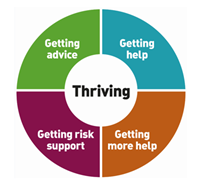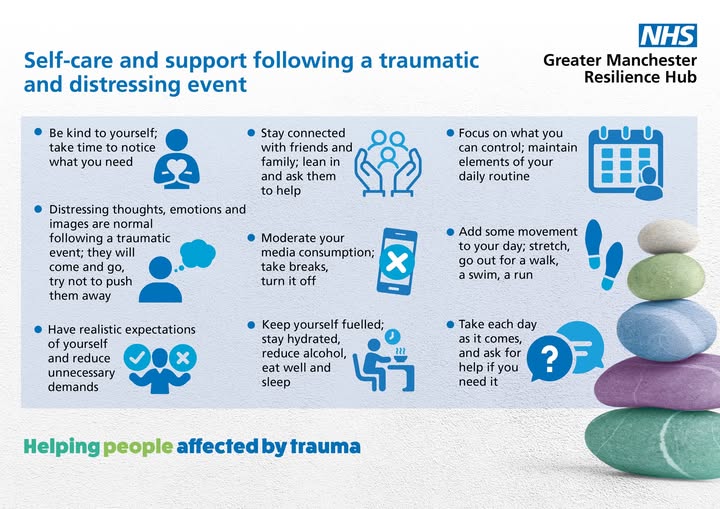What is Safeguarding & Prevent
Safeguarding is the term used when talking about protecting vulnerable adults and young people from abuse or neglect.
At college, safeguarding is our top priority and we want to do all that we can to keep the young people and adults on our courses safe.
Prevent is the Government's strategy to stop people becoming terrorists or supporting terrorism, in all its forms. Prevent works at the pre criminal stage by using early intervention to encourage individuals and communities to challenge extremist and terrorist ideology and behaviour.
If you are worried about your safety or that of someone else, please speak to a trusted adult immediately. The contact details of the safeguarding team can be found below.
Safeguarding Contacts
If you need to contact our Safeguarding Team, to discuss any issues you may have, please click 'Contact the Team' above. Key contacts can be found on the right: |
Kimberley Cash
-
Salford City College Group - Designated Safeguarding Lead
|
What is Extremism and Radicalisation
Sometimes when people have very strong views they become extreme. This means the views they are expressing go beyond what the majority of people think are OK to hold. When someone is becoming more extreme in their views, they become increasingly intolerant of other people’s opinions when they oppose or challenge their own.
This can be very challenging for the friends and family who care about them and are worried about the path they are going down.
Radicalisation is the word commonly used to describe the mental process the person is going through as they get drawn down a dangerous path.
If someone is becoming radicalised it means they are displaying extreme views in support of extreme ideologies or beliefs, terrorist groups and activities.
It can be hard to spot if someone is becoming radicalised, as some of the signs are indicators of other underlying issues, or challenges that are not connected to radicalisation.
But we know friends and family are best placed to spot any changes in behaviour. If you’re worried they are vulnerable then reach out and speak to someone. This could be your GP, a faith or community leader, your local authority or a teacher.
Why do young people become radicalised?
Violent far-right or Islamist extremists, usually attract people to their cause through a persuasive narrative which will attempt to explain why a person may feel certain grievances, thus justifying any violent or criminal actions which are seen to avenge any perceived wrongs suffered.
Young people may be drawn to extreme views because:
- They may be searching for answers to questions about identity, faith and belonging
- They are trying to make sense of world events
- They have a personal grievance or experience of racism or discrimination and feel they want to change things
- They are under pressure from their peers who have links with these
Recognising the signs of Radicalisation
The following could describe general behaviour but together with other signs may mean a young person is being radicalised:
- Out of character changes in dress, behaviour and peer relationships
- Spending increasing amounts of time online
- Becoming quick to condemn others who do not share their beliefs without interest in their point of view
- Secretive behaviour
- Losing interest in friends and activities
- Becoming isolated or withdrawn
- Showing sympathy for extremist causes
- Justifying or even glorifying violence
- Possessing illegal or extremist literature
- Speech that sounds scripted, or usuage of new vocabulary
CONTEST - The government's counter terrorism strategy
CONTEST is the government's counter terrorism strategy and is made up of four parts:
- Protect - Strengthening our protection against a terrorist attack
- Prepare - Mitigating the impact of a terrorist attack
- Pursue - Working together to stop terrorist attacks
- Prevent - Stopping people becoming terrorists or supporting terrorism
The college has a legal and moral duty to implement the Prevent aspect of this strategy.
During their time at college, all students will engage with resources, activities and support (where applicable) to safeguard them from radicalisation. If you are worried that someone you know is being drawn into terrorism, please contact a member of the safeguarding team.
Salford Thrive - If you have been affected by the recent terrorist attack, please know that support is available.
If you have been affected by the recent terrorist attack, please know that support is available.
The Resilience Hub was set up in response to the Manchester Arena Attack in 2017 to co-ordinate care and support for thousands of children, young people and adults whose mental health and/or emotional wellbeing was affected.
Since then, they have grown and developed to provide a range of specialist, psychological support services to help people affected by trauma.
You can also reach out to the NHS mental health line, available 24/7, by calling 111 and selecting option 2.
Please see more information below:
💙 NHS 111 mental health line, available 24/7
Call: 111 and select option 2
📍 Greater Manchester Bereavement Service (Monday to Friday, 9 am to 5pm)
Call: 0161 983 0902 Or email: gmicb-sal.gm.bs@nhs.net.
 |
Children’s Services
Salford City Council
Email: EHWB@salford.gov.uk
|
|

|